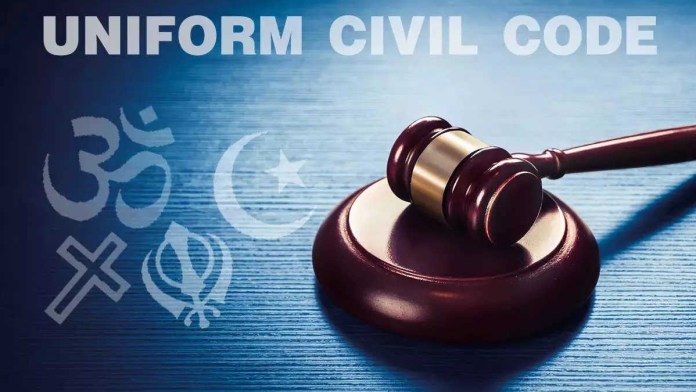In what could be seen as Prime Minister Narendra Modi’s promise early in his current term that his government would do “unthinkable” things, MP Kirodi Lal Meena of the Bharatiya Janata Party (BJP) tabled a private bill for a proposed Uniform Civil Code (UCC), dated 2020, in the Rajya Sabha amid acrimonious opposition that placed three motions against soon after. The opposition claimed that the code would disintegrate the country and hurt its diverse culture.
But the motions from the opposition to the UCC in India Bill 2020 was defeated through votes by 63-23.
An opposition MP said a bill with such wide ramifications on people’s lives could not be introduced without wide public consultation with various communities. CPI(M) MP John Brittas referred to a Law Commission report, which said a UCC was neither necessary nor desirable.
The UCC bill provides for the constitution of a National Inspection and Investigation Committee for preparation of the uniform civil code and its implementation all over the country. The BJP had been demanding a UCC since the heady days of the initiation of the Ram Janmabhoomi Movement in the late 1980s. The Gujarat manifesto of the party promised to introduce the UCC in the state assembly.
The bill was introduced in the upper house just a day after the BJP’s record win in Prime Minister Modi’s home state while the top leadership of the Indian National Congress (INC) is busy managing Rahul Gandhi’s Bharat Jodo Yatra, a public relations exercise to relaunch the dynast.
What does the UCC bill contain?
The UCC says every law of the land must apply to all citizens of the country irrespective of religion and caste. The code is mentioned under Article 44 of the Constitution of India as a Directive Principle of State Policy — as an ideal that the Indian state must pursue.
The kind of UCC that the Directive Principles of State Policy proposes aims to address the issues of discrimination against vulnerable groups and gender biases. These provisions are not enforceable but are meant to serve as the guiding principles of legislatures.
“Article 44 of the constitution provides that state shall endeavour to secure for the citizens a uniform civil code throughout the territory of India,” Minister of Law and Justice Kiren Rijiju had told the Rajya Sabha in a written reply dated 7 April. The minister said, “the states are also empowered to legislate” upon “personal laws such as intestacy and succession; wills; joint family and partition; marriage and divorce, relate to Entry 5 of List III Concurrent List of the Seventh Schedule to the Constitution…”
What has Sansad done about a UCC?
While no previous government dared touch the Directive Principles of State Policy’s prescription for a UCC with a barge pole, a bill to that effect has earlier been introduced in the current parliament. It sought to “provide for the constitution of the National Inspection and Investigation Committee for preparation of Uniform Civil Code and its implementation throughout the territory of India”.
MP Chandrakant Khaire had introduced the UCC in India Bill, 2018, calling for a formation of a “committee to take such steps, as it may deem appropriate, for codifying and implementing the Uniform Civil Code in the country”.
On 22 July, Kiren Rijiju, in another written reply in the Lok Sabha, had clarified that the matter was sub judice and, therefore, “no decision on implementation of uniform civil code in the country has been taken as of now”.
Why is UCC an inalienable part of the Sangh Parivar’s ideology?
Both Dr Keshav Baliram Hedgewar, the founder of the Rashtriya Swayamsevak Sangh (RSS), and Syama Prasad Mookerjee, the founder of the Jana Sangh, the predecessor of the BJP, were initially members of the Congress. They separated from their first political organisation based on a common grievance that the party was being unfair to Hindus. In independent India, the ‘unfairness’ manifested by way of, among other things, separate laws to judge followers of different religions.
If a UCC is made, it will be applicable in matters such as marriage, divorce, inheritance, and adoption. However, as of now, in the absence of a uniform law governing personal matters, many personal laws apply to different religious communities in the country. Arguably the greatest eyesore for Hindus is the Indian state governing Muslims with the Shari’ah in civil matters like birth, death and marriage, which, among other things, lets Muslim men to be polygamous.
During the early days of the Ram Janmabhoomi Movement, the Sangh Parivar, primarily comprising the RSS, the BJP and Vishwa Hindu Parishad (VHP), would go around telling the people through speeches of their leaders that polygamy was helping Muslims proliferate, with four wives instead of one birthing babies, thus skewering the demographics of the country with a larger and larger Muslim population.
However, that may not be a mathematically sound calculation. In a given sample of population of a nearly equal number of men and women, if every man is polygamous, a lot of men will get no wife. Officially, of course, no Sangh office bearer of BJP functionary has made the mathematics-defying claim for many years now.
Will the common code be pro-Hindu and anti-Muslim so to speak?
No. The proposed committee will decide the best practices in separate personal laws and try to pick them to make one law that would apply to all. While that may mean banning polygamy, for example, which is sanctioned in Islam, there are other things the committee may find appreciable in the Shari’ah and personal laws of followers of other religions, which may make it to the UCC.
Such civil laws include laws governing births, property distribution within family members and inheritance, women’s rights, child rights etc. For example, the Shari’ah does not allow a Muslim to leave behind a will. If the committee believes that is a better provision than letting a parent decide what part of his or her property would go to which child, which Hindu parents are allowed to decide by law, the law that so far applied only to Muslim inheritors would apply to inheritors from all religious communities.
As the following section will prove, the UCC can do justice even to wronged Muslim women.
Why is there a need for a UCC in social and legal matters?
Legal: The Shah Bano case provided a glimpse of the problems court face while personal laws and how it affects those vulnerable. While the Supreme Court had pronounced a judgment in the case of Mohammed Ahmad Khan versus Shah Bano Begum and Others, it had set off a big political fight over “the extent to which courts can interfere in Muslim personal law”.
Shah Bano had approached the court demanding maintenance for herself and her five children after her divorce from her husband who had given her irrevocable talaq. However, her husband contested that the Muslim Personal Law in India required the husband to only provide maintenance for the iddat period after divorce. Iddat is the period after which the divorced man and woman can marry again.
After the hearing, the court directed that Shah Bano be provided with living expenses. But, “the Supreme Court had directed the parliament to make law related to the Uniform Civil Code,” the bill by Khaire mentions.
Social: This ‘cooling down’ or gestation period might be theoretically better than the marital arrangements people of the Middle East had pre-Mohammed, but it fails practical considerations such as the feasibility of an old woman with five children getting another husband. If the woman is young or even otherwise manages to find another man in her life, another typically Islamic issue follows.
If the first husband has had a change of heart and he wants his first wife back in his life, the woman must have by then married and divorced another man to be able to marry her first husband again. This arrangement in the Islamic society is referred to as halala. A woman, in order to satisfy the Shari’ah, is often reduced to the status of an abandoned prostitute, as the second man is not serious about the relationship with this woman while the first husband refuses to take her back home after she has had a conjugal life with another man.
Why are Muslims, the opposition and even a section of pro-Hindu voices opposing it?
With the uniform law for all religions, balancing the Right to Freedom of Religion and the Right to Equality becomes difficult. If enacted, “the same set of secular civil laws” will supersede the right of citizens to exercise several personal laws based on their religion or ethnicity.
However, it is more likely that Muslim men are opposing the move because it will probably snatch away from each one to have up to four wives simultaneously.
The UCC is likely to bring several changes to Muslim Personal Law, including the abolition of polygamy practices. The Muslim Personal Law (Shari’ah) Application Act was passed in 1937 to formulate an Islamic law code for Indian Muslims.
AIMIM chief Asaduddin Owaisi once said: “It (UCC) is not required in this country. As per Goa civil code, Hindu men have the right to second marriage if the wife fails to deliver a male child by 30. Law Commission has opined that a UCC is not required.”
In 2016, Owaisi said the UCC was not merely a Muslim issue. “It’s an issue which will be opposed by the North East, especially Nagaland and Mizoram,” he said. A report mentioned that around 12% of India’s 8-10 crore tribal population live in the Northeast, as per official figures. These tribes follow their laws based on their customs.
A section of Hindus that surfaced post-2019 and has been increasing in strength, claiming the Modi government is doing certain things that work against Hindu interests, say that the government may cite its interference in Muslim matters as a justification for the state’s continuing interference in Hindu matters. These Hindus give instances like turning pilgrimage centres into tourist spots, Prime Minister Modi admonishing cow protectors, pushing a Muslim teacher in Banaras Hindu University for practical Vedic studies, renovating Varanasi in a manner that the Akshay Vat collapsed, uprooting several Shiva Lingas while making the Kashi Vishwanath Corridor, failing to protect Hindus in Kashmir even after revoking Article 370, etc to establish their point. This section of Hindus had earlier said that the ban on triple talaq did not concern their community and, therefore, there was no point in a Hindu celebration of the legislative work.
Voices in favour of a common law
Batting in favour of the UCC, Madhya Pradesh Chief Minister Shivraj Singh Chouhan said, “Why does a man marry more than once? Why are there two sets of (personal) laws in one country? He said this while announcing that a committee will be formed to implement the UCC in Madhya Pradesh.
BJP spokeswoman Sanju Verma wrote an article for Firstpost and shared it on Twitter, saying that India’s civil code had evolved from Vedas and Manusmriti, which were sermons by Manu, Bhrigu and Narad. “Regressive customs like polygamy and child marriage stopped having legal and moral sanction long back. If Hinduism can evolve,what is stopping Owaisi” and his ilk, she wrote.




You must log in to post a comment.